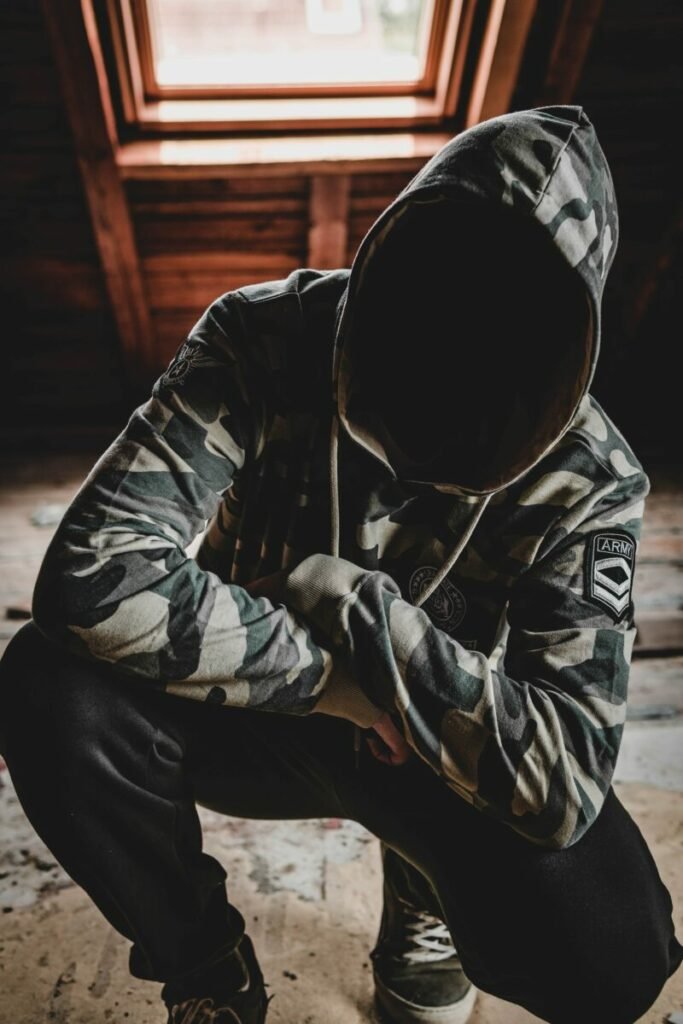
The back of Bill’s neck smells for some reason of peach and is delightfully warm to my lips. He murmurs something I don’t catch but sounds like a note of appreciation. I turn my attention to the tangles of his hair, scented with some fairly pleasant chemical with overtones of coconut. He makes no further comment but squeezes back into my embrace, warm inside his thick toweling bathrobe. I’ve caught him on the landing. The sun streams in through the roof light as if the gods are pouring honey.
“What time is it?” he asks.
“Nine. But it’s Sunday so there’s no hurry. We can take our time.”
“My time or your time?”
“Both.”
“Is your time ripe for breakfast?”
“Overripe.”
“Oh no, then wasps will come.”
We both laugh, Bill’s body shaking gently. He turns to face me. His missing front tooth, waiting to be replaced, gives him the air of those women on old prints crying, “Round and sound, three pence pound.”
“Lizzie,” he says, “you’re looking worried again.”
“Sorry.”
“Listen, everything will be okay.”
“Will it?”
“It’s only money, not death or desperate illness. So.”
He falls silent and looks beyond me the way he does when lost in thought.
“What are you thinking?”
He smiles. “Remembering our first apartment. The shared bathroom. Mrs Thing leaving notes, ‘Please clean the bath after use.’”
“Every word underlined or in capitals so the emphasis was lost.”
“We should have been compassionate instead of mocking.”
“We were young.”
As I enter the kitchen in my dressing-gown heading for the espresso maker I can tell it’s William scrubbing the worktop with raw energy, giving me quick sidelong glances.
He says, “I’ve told you over and over about this. Why you can’t spread a piece of bread without making everything filthy is beyond me, but what’s the point in mentioning it, you never listen to what I say.”
He turns to face me, lips drawn back from his teeth. It’s like being confronted by a wolf.
“Sorry.”
“And what have you done with the bread? Used it all, I suppose, without saying.”
“There’s more in the freezer.”
“Where?”
I pull out the third drawer down and take out a sliced loaf.
William says, “That’s the drawer for fish and other seafood. And that’s that horrible white bread.”
“We got it when Jeannie came. She likes it.”
“I keep asking you not to run out of fresh bread.”
“Shall I toast this?”
“And how long do we have to suffer this?” He flings out a hand towards the blackened walls and ceiling, the charred cupboard doors. “I can’t live like this. The whole apartment smells of smoke, it’s horrible.”
“It’s in the pipeline.”
“What the hell does that mean? It could take forever. You said you’d chase them.”
“I will, tomorrow. They aren’t there today.”
“And you’ll forget as usual and another day will be wasted. Procrastinate is your watchword.”
He keeps up the rapid glances as if checking my reaction to his words. I’m trying to learn patience, which is supposed to be good spiritual training. I reflect that ‘procrastinate’ from Latin pro cras literally means put off till next day, not several days. Then tell myself, as William shoves me out of the way to reach the espresso maker, that I’m being dry and unhelpful. Nevertheless I can’t find appropriate words or actions. He makes coffee with the choreography of disapproval.
In the lounge Gwylim is on his iPad.
“Come sit next to me,” he says.
I sit. Our thighs touch.
“What are you looking up?”
“What I’m thinking, my love, is we need to decide on Christmas presents.”
“I thought we were having an amnesty.”
“For the adults, not the children.”
“Oh yes, of course.”
“Well?”
I mutter, “They’ll have to be really cheap. Unless . . .”
“I know. If you send the brokers more photographs that might help.”
“Good idea.”
His matter-of-fact tone reassures me. I feel I can cope.
“So. Presents,” I say. “Any ideas?”
Gwylim exhales with a pout. “Not really. Lonnie likes cooking, Maybe a cupcake decorating outfit? I know he likes drawing and painting, but we got him paints for his birthday.”
“Could work. Or . . .”
“Or . . . ?”
I realize I’m holding back, nervous, as if talking to William. Gwylim’s clear-eyed look and the humorous twist of his lips remind me I can safely make suggestions.
“In that kitchen equipment catalog there’s a child-size chef jacket and hat.”
“Show me.”
I show him. I like the way he presses down the page with his index finger, rubbing it slightly.
“Could go down okay. Kids like dressing up,” he adds dreamily, gazing through the window at the fuchsia waving its red lanterns, some already stripped by an envious wind.
“It’s not just dressing up, it’s practical. Educational even.”
He smiles. “If you say so.”
“What about Timmy?”
He says, “A pocket compass? He likes that thing, what do you call it, Geocaching.”
“Hm. A hand-held GPS would be more it. You’re a bit old-fashioned, my dear.”
“More imports from China? Let’s think about it. What about Mia?”
“Oh God. A fairy outfit?”
Gwylim laughs. “You’re kidding.”
“That’s my opening bid.”
He scratches his head, thinking. “Aren’t police uniform or a skeleton suit more her style?” He sighs. “It’s difficult, Lizzie. Let’s take a break.”
Here on the promenade the sea is heaving and thumping and the gulls are screaming their heads off. The size of their beaks intimidates me, but I feel cheerful the conversation with Gwylim has moved things on. As I walk I suddenly feel an arm link my left elbow. I bring my hand round and squeeze. A warm hand in a woolen glove squeezes back three times. It’s Bill.
He says, “Remember that walk by the Swallow Falls? The weather was just like this.”
“I’ll never forget it.”
“What did you think of me then?”
“A bit silly.”
“Hah!” He stops walking and turns to stare at me.
“But impossible to ignore. You filled my horizon.”
“Oh wow.”
His eyes are moist. I squeeze his hand again and he squeezes back three times.
“What did you think of me?” I ask.
“Too much a city kid. Out of place in the mountains.”
“Oh hell, and I’ve always felt at home there. Those were the days, eh?”
“No, these are still the days. And stop worrying. No doubt the universe is unfolding as it should.”
“But please remind me tomorrow to do the necessary.”
He nods. We walk on, linked, in silence.
Just after three p.m. in the Seaview Café, the sun obscured by a bank of cloud, I bring to the corner table two medium cappuccinos (‘medium’ surprisingly large) and two slices of polenta lemon and almond cake. I put the tray down carefully because my glasses have steamed up.
“What’s this?” William asks.
I don’t need to wipe my glasses to be aware it is he.
“This is typical of you,” he snaps.
It takes others to note what’s typical of one. It’s usually a surprise.
“What’s typical?”
My voice seems to come from some neglected mechanism in need of oil.
“That you know I’m on a diet and yet insist on bringing me a stonking great cappuccino instead of a flat white. And cake! Who asked for cake?”
“I’ll take it back.”
“No! No! No! You won’t. You know damn well now it’s in front of me I’ll eat it.”
Which he does, in silence, with staccato movements, using his second finger to round up crumbs.
He says, “I could make low-calorie cake myself if the fucking kitchen was usable. Fancy leaving a deep fryer to catch fire!”
I realize how light I felt before, because now I’m a mass of lead. I could retort that he distracted me from the deep fryer with a long-drawn-out panic choosing the best route to a funeral. But I don’t. I gaze out at the white horses decorating the grey sea. Another time they’d please me, but now they’re the failed attempt of some celestial clown to enliven his act with streaks of make-up.
This evening on TV there’s a costume drama. Escapism is what I need after the contretemps with William. Sitting calmly beside me, Gwylim is making comments, a habit I like when the entertainment is undemanding.
“Nice color,” he says.
“Where?”
“In that Regency drawing-room.” He points to the TV.
“Ah, yes.”
“In the next ad break, shall I root out the color chart?”
“Really?”
He fixes me with a look. “There’s nothing to stop us choosing paint.”
“Even though . . .”
“Let’s dream. We could be dead tomorrow.”
In the drama the male lead, in knee britches, brocade waistcoat, and tricorn hat, is berating the female lead in shepherdess costume about the frivolous behavior of her daughters.
“Trouble is,” Gwylim says in an undertone, “whatever part that guy plays, I think, Yeah, but that’s not Lord Whatsisname, just old So-and-so the actor again.”
“I know what you mean. Over-exposed. And who’s the woman? I’ve seen her in something, but what? A coffee ad?”
“Oh hell, yes, I’ve seen her as well, and I can’t think what. It’s distracting.”
After the ad break we study the chart, watching in case the drawing-room in the drama reappears. Meanwhile a carriage and four trundles along.
“I like Field Puddle,” Gwylim says.
I laugh. “I thought you meant the splashes from the carriage wheels.”
He laughs too, and stabs the chart with that strong index finger.
I say, “I wonder who thinks of the names.”
“Unrecognized poets? Maybe Field Puddle’s too dark.”
“Blue Bows is the same hue but lighter.”
“And a nicer name. But maybe one wall should be white.”
“We had a big tin of white for the bathroom. There might be some left. In the shed.”
He says, “When this ends I’ll go look.”
Much later—it seems—heavy footsteps. I brace myself. I’m not surprised when William appears.
“More money wasted,” he says through gritted wolf teeth.
“What do you mean?”
I hate the way that came out, in a squeak, as if I’m a sleazy accountant caught embezzling funds for the blind.
“You left the lid off. Not only has most of the paint dried up, flakes of rust off the roof have fallen in, together with several dead spiders. So it’s ruined.”
I almost say what appear to be dead spiders might be sloughings from when they molt, but decide to venture instead, “I’ll get more.” Then realize this is throwing gasoline on a bonfire that’s already going quite nicely, thank you.
“What with? Didn’t you notice the account is overdrawn?”
“Not by much. I’ll transfer—”
“You’re so wasteful. Waste waste waste. Like those shelves you bought that didn’t fit and are now rotting in the garage.”
I take ‘rotting’ to be an example of hyperbole, but before I can point this out he goes on, “I wanted to save some money to get a new tooth. I suppose you enjoy seeing me look like a beggar.”
Since a rhetorical question is one that requires no answer, I offer none.
He says, “They’ll never pay that insurance claim because you probably filled out the form wrong.”
Fortunately the phone rings with a call, which seems to be for him because he disappears with the handset into another room. I fill in the quick crossword and the Codeword in the newspaper, which to some extent settles the crawling sensation in my guts that always follows my encounters with William.

An hour or so later, measured footsteps in the hallway. I shut my eyes and hope it might be Gwylim—or even Bill. Someone comes in and sits on the settee beside me.
“Can I have a bit of the newspaper?”
Gwylim. He reads in silence for a few minutes. I breathe deeply, relaxing.
He says, “This article is about Easter Island.”
“Ah, where they have those weird statues.”
“It says those might have been moved from the quarry by mental power—mana.”
“Wow.”
“Just think, Lizzie. If mana could move statues it could turn away spears, arrows, bullets, and turn stones into weapons. The Easter Islanders could have conquered the world.”
“We could all be speaking Polynesian.”
He grins at me, trying to hide the gap in his teeth with his top lip.
“By the way, don’t get your hopes up, but Reynolds texted saying he’s about to email us.”
“Saying what?”
“He didn’t explain.”
Gwylim raises his eyebrows and carries on reading.
My optimism about Reynolds’s text has given me enough concentration for study, and I carry on reading about the early Christian church. Who knows, I might go for a degree one day, but it’s mainly to keep my mind ticking over. I’ve got as far as the Council of Nicaea where they argue about the doctrine of the Trinity.
I must have dozed, because I surface to feel someone kiss the top of my head and stroke my cheek.
“Brought you some cocoa,” Bill says.
“Oh, brilliant, thanks.”
“I’ve a feeling Reynolds will pay the claim in full.”
“Phew. I hope so.”
He remains standing in front of me. I should reach out to draw him close, but the day’s events have knocked the stuffing out of me.
“Well, goodnight, my darling,” he says, kisses the top of my head again, and drifts away.
I need to distract myself with something uncontroversial, and find myself looking on the map at tripoints: Colorado-Kansas-Nebraska, Germany-Belgium-Holland, and so on. Then drain the cocoa ready for bed. I clean my teeth with my ordinary toothbrush so as not to disturb anyone with the buzz of the electric one.
In the bedroom the curtains aren’t quite closed and a yellow streak from the streetlamp lies across the bed. I can just make out a sleeping form, head facing the wall, duvet up to his ears. Who is it? Bill? That thought makes a ball of heat grow in my chest and spread . . . down . . . down. If I were a cat I’d arch my back, tail high. It might be Gwylim, though. Now the warmth diffuses calmly to my toes and fingertips and I yawn. If a cat I’d purr and stretch. On the other hand . . . is it William? The one most in need of love. Okay. I decide: If it’s him, when I slide in quietly and carefully beside him, I’ll bite him to bits, gobble him up, and store him safely under the hot springs of my heart. He may be a wolf, but I’m the Cat Goddess of Apartment 15B, am I not?

Share this post with your friends.

